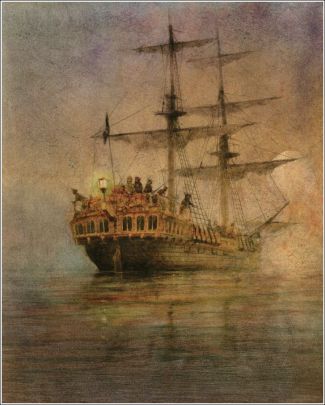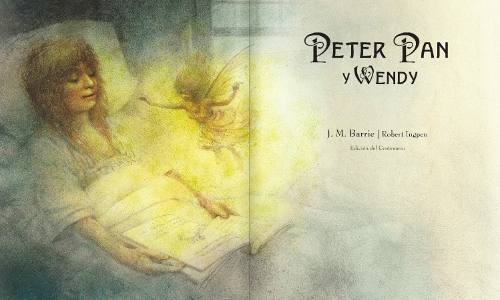All children, except one, grow up.
With the possible exception of Frankenstein, this is the first review I’ve written for a book where I was familiar with the story before I’d even seen the first page (though it won’t be the last, I’m sure). In this case that was actually very helpful – once the basic beats of the plot were dealt with (given that I knew them so well), I found myself much more able to focus on the conceits of J.M. Barrie’s writing that make Peter Pan such a timeless and magical story.
The key strength of the book lies in its grave childlike sincerity – much like our protagonist(s) it is kidding yet serious, childish yet mature, wildly imaginative yet absolutely real, piling contradictions upon contradictions in a way that irresistibly sweeps the reader into the world Barrie has created. This is a story that absolutely thrives on tonal dissonance; at the beginning of the story, believable elements of the real world are intertwined with surreal and fanciful ideas without ever pausing to question the veracity of such notions, setting the tone for the story almost instantly. In a world where the Darling parents see nothing odd in appointing a dog as their children’s nanny (treating her no differently to how they’d treat a matronly woman, of course), then why would the reader take issue with the children later satisfying their hunger on imaginary meals?
The book is filled to bursting with incredible feats of imagination, from the initial excitement of flight through to the sprawling expanse of Neverland’s flora and fauna. Everything is drawn compellingly, creating a tangible backdrop for o ur heroes to have their myriad adventures before. Every character possesses an emotional gravity which grounds these fantastic elements, providing the reader with a narrative anchor they can invest in, with characters as diverse as the Darling parents and Captain Hook given equal emotional weight and believable thought processes.
ur heroes to have their myriad adventures before. Every character possesses an emotional gravity which grounds these fantastic elements, providing the reader with a narrative anchor they can invest in, with characters as diverse as the Darling parents and Captain Hook given equal emotional weight and believable thought processes.
But amongst the omnipresent whimsy, darkness pervades. Captain Hook is about as evil as villains get, the swashbuckling scenes are surprisingly violent, and the consequences of the children’s decisions are pretty uncompromising, especially regarding the grief-stricken state the parents are left in and the lack of sympathy they’re shown by the children at the end. Peter himself is a tragic figure, desperately clinging to childhood yet remaining blind to the inherent loneliness of his situation and the cyclical pattern of his life stretching into an infinite regress of ungraspable melancholy. Stubborn yet fun, bossy yet loveable, terribly unhappy yet unceasingly adventurous, he is the beating heart of the book and a fantastic companion with whom to share the adventure.
As I’ve said, the book feels childlike in the way that it’s written, and this trait manifests in what is, to me, the book’s only problem: pacing. The final confrontation between Peter and Hook is over all-too-quickly, and I would have liked to have dwelt on it a little more. Instead, it is glossed over in favour of the emotional climax of the children returning home, which I’m not unhappy about, though I feel it could have been handled better.
I am honestly a little cross with myself that I didn’t read this book sooner – especially because the illustrations you see here, by the incredibly talented Robert Ingpen, come from the gorgeous edition of the text my sister bought me 2 and a half years ago. It has certainly now become one of my most treasured volumes, and I look forward one day to showing my children to Neverland and introducing them to The Boy Who Wouldn’t Grow Up.



Which edition do you have that features the illustrations? Great review, by the way. It’s so hard to find a review which doesn’t spoil anything. That’s the way I do my reviews, and it’s nice to find others who operate the same way.
LikeLike